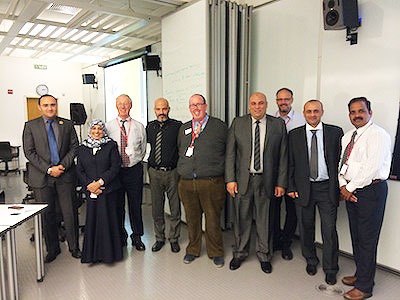WCMC-Q and Australian university share innovative teaching method with Qatari high schools
February, 2014

Visiting experts from Curtin University of Technology delivered
the workshop to Qatari high school chemistry teachers in
partnership with WCMC-Q.
Weill Cornell Medical College in Qatar (WCMC-Q) and Curtin University of Technology hosted a workshop for the Supreme Education Council to introduce local high school teachers to an innovative inquiry-based learning method.
WCMC-Q’s Dr. Sheila Qureshi, Senior Lecturer in Chemistry, organized the workshop on the Process Orientated Guided Inquiry Learning (POGIL) system, which was delivered in partnership with visiting education experts from Curtin, which is based in Perth, Australia. The team from Curtin University included Dr. David Treagust, John Curtin Distinguished Professor; Dr. Daniel Southam, Senior Lecturer and Director of First Year Studies; Venkat Vishnumolakala, Postdoctoral Research Associate; and Mauro Mocerino, Associate Professor in the Department of Chemistry. Dr. Katherine Bradley, who is soon to be appointed WCMC-Q Postdoctoral Associate, completed the WCMC-Q team delivering the workshop.
The workshop, held at WCMC-Q on Sunday 16 February, focused on the teaching of chemistry and was organized as part of a National Priorities Research Program (NPRP) project, entitled ‘The utility and cultural transferability of student inquiry learning approaches in foundation chemistry: improving conceptual understanding, attitude and self-efficacy”.
Dr. Qureshi said: “In local high schools teaching tends to be based on the traditional method of a teacher standing at the front of the class and leading the students through the curriculum. The aim of the workshop was to introduce teachers in Qatari schools to a method of teaching that engages the students more effectively and encourages them to develop independent learning habits and critical thinking skills.
“These skills are especially vital for students who want to go on to study at elite universities where they will be expected to become independent learners.”
The one-day workshop featured presentations about POGIL and interactive learning exercises that allowed the teachers, representing 28 Qatari high schools, and science specialists from the Supreme Education Council to experience how the method works. POGIL utilizes group activities and workshops that require students to work in teams with assigned individual roles to complete tasks based on the material presented by the teacher. Research in Australia has shown that average test results achieved by students increase by 6-15 percent when using the POGIL method, while failure rates decrease by 10-20 percent. In addition, POGIL is designed to develop problem-solving, communication and cooperation skills, and help students become life-long learners.
Dr. Southam said: “The main benefit of POGIL is its focus on enquiry-based learning, which encourages students to develop their own, independent understanding of the curriculum by engaging with the material. This is quite different from traditional teaching methods, so the system has to be presented in a way that also engages teachers who are likely to be unfamiliar with this approach. We are very happy with how today has gone because our ideas have been received exceptionally well by the teachers.”
Mohamed Abdulfattah Sayed, Chemistry Coordinator at Omar Bin AlKhattab Secondary Independent School, was impressed by POGIL.
He said: “The wonderful thing about this method is that each lesson is based on a series of stages, with tasks that require the student to be actively involved. Therefore, there is no ‘dead time’ in which the student can lose concentration.
“This has a number of advantages over the traditional ‘chalk and talk’ method, especially in a subject like chemistry, which can be rather boring if you just read the material from a text book. But when it is presented in this engaging manner, chemistry suddenly becomes very exciting, challenging and rewarding for students.”
